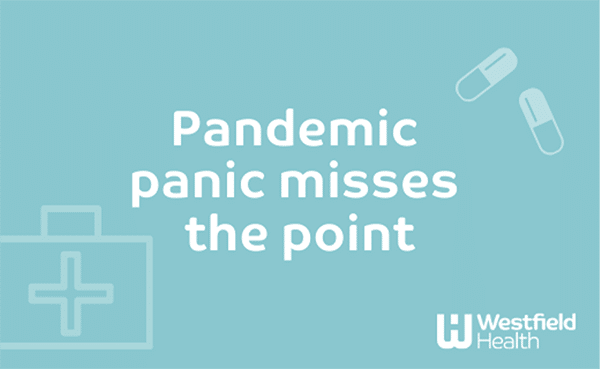Whether it’s Greg James singing about handwashing on the radio or #toiletpaperpanic trending on Twitter, it’s impossible to miss the latest updates on the COVID-19 virus outbreak at the moment.
And — for the most part — that’s a good thing. Making sure people are aware of proper hand hygiene and the steps to take if they have symptoms will be key to containing the virus and making sure the NHS isn’t overwhelmed.
But there’s also a flip side to it. From police breaking up stockpiling fights at supermarkets to even more fake news, it’s turned into an epidemic of health hysteria.
Rather than this boom-and-bust cycle of ignoring our health on a day-to-day basis then panicking when a new virus hits the headlines, we need to be thinking about how to maintain our health in a more sustainable, ongoing way.
Good health doesn’t come from wearing a face mask. It doesn’t come from washing your hands for the proper amount of time only when there’s an outbreak. It comes from the little things we do every day that make a big difference to our long-term health and wellbeing.
Recent findings from the World Cancer Research Fund showed that healthier lifestyles could lead to 150,000 fewer cases of cancer in the UK each year — that’s 1.5 million fewer cases over the next decade. With one in two of us now due to be diagnosed with cancer during our lifetime, who wouldn’t want to minimise that risk?
The best news? It’s not complicated — it’s about getting the basics right consistently and sustainably: not smoking, cutting down on alcohol and swapping the foods we know aren’t good for us for a healthier diet.
We might have heard it all before, and it might not be headline worthy, but it should be. Things have got to change — as a society, we’re at breaking point.
Throughout the coronavirus outbreak, questions about how well the NHS can cope have dominated the debate. With 1 in 20 coronavirus patients needing critical care, the NHS only has 6.6 critical care beds for every 100,000 people compared to 29.2 in Germany.
Our health care system is at capacity. That’s not down to the outbreak itself, but to the burden of treating non-communicable, preventable diseases.
Type 2 diabetes, for example, costs the NHS £10 billion a year, accounting for about ten percent of the NHS budget — that’s almost enough to run the police service in England and Wales for a whole year.
In 2017/2018, there were 10,660 hospital admissions due to obesity, and it’s estimated to cost the wider society £27 billion.
There’s a never-ending list of statistics like this, and it’s a testament to our failings to recognise and protect our health every day.
Ill health due to preventable disease is costing us dearly — physically, socially and economically.
We can’t carry on like this. Ignoring the importance of preventative healthcare puts us all at unnecessary risk during these high-pressure, acute situations like a coronavirus outbreak.
It means that instead of having the capacity to respond, we’re already stretched beyond our means. Ignoring our everyday health is putting us all at risk.
Yes, it’s important to take extra precautions when new illnesses pop up, but what will have a far greater impact on our health as a nation is to invest our time, energy and resources in those everyday things that will keep us well for a lifetime, not just during an outbreak.
If you’re looking for information and advice on coronavirus in the workplace, our free Employer Guide: COVID-19 covers everything from how to prepare and minimise risk to creating a Coronavirus Response Plan. Download the guide here.

References:
Sky News: 400 cancer cases a day in the UK could be avoided by healthier lifestyles, says charity
Cancer Research UK: Cancer risk statistics
The Telegraph: Coronavirus: why a shortage of critical care beds could be deadly
Diabetes UK: The cost of diabetes report
NHS: Statistics on Obesity, Physical Activity and Diet, England, 2019
Full Fact: Police funding in England and Wales